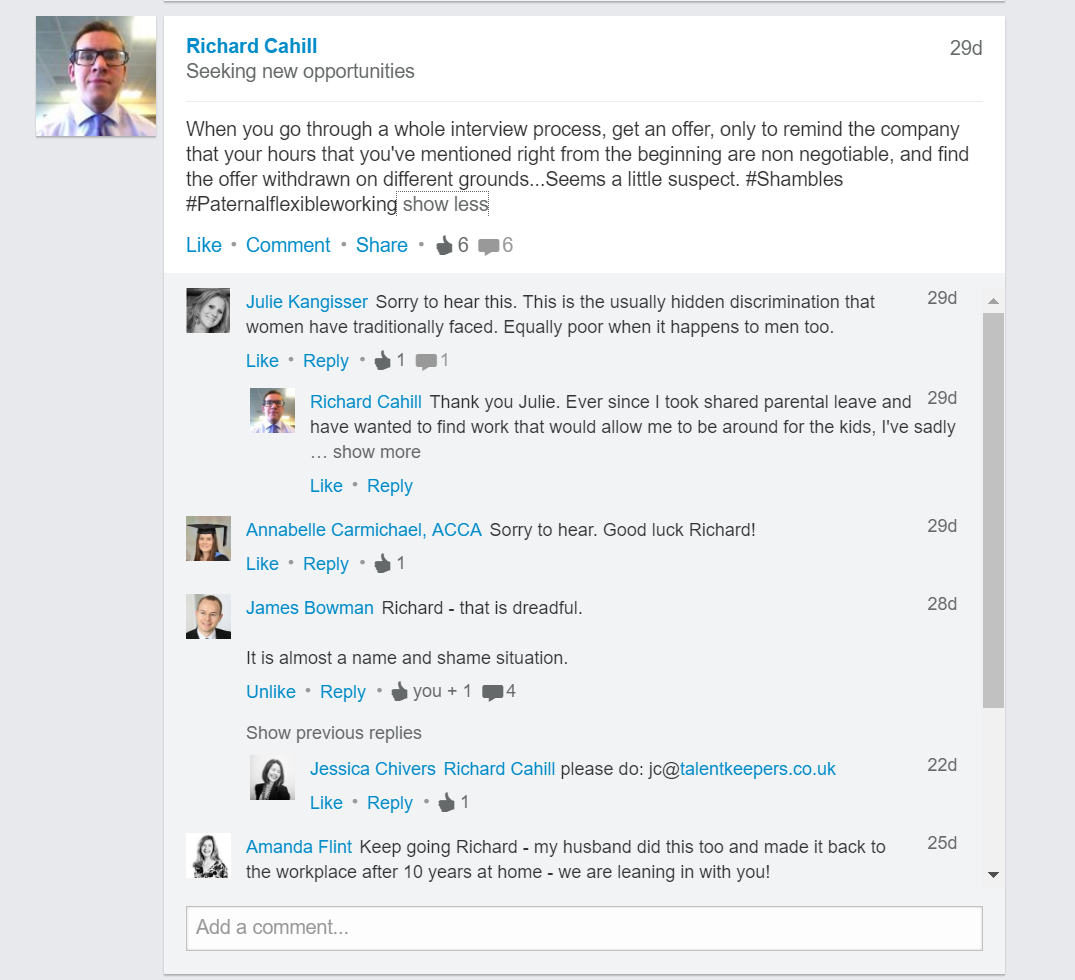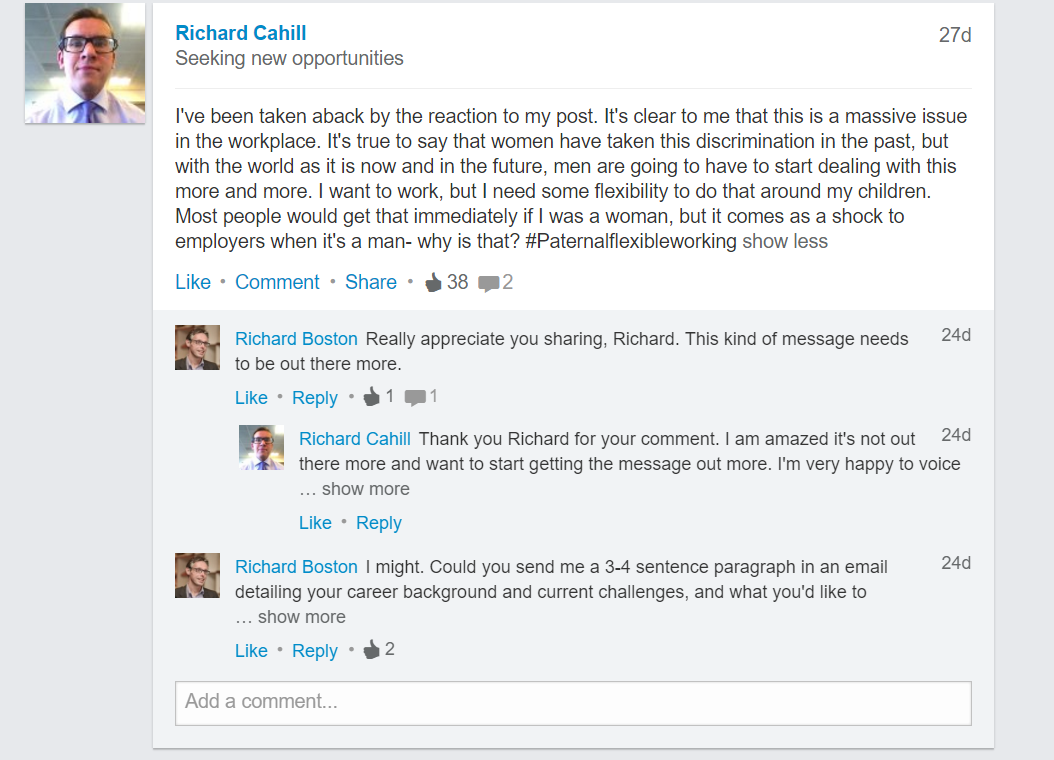Flexible Father – Richard Cahill
This post is part of our #FlexibleFathers series and we’re spinning the spotlight on tax specialist Richard Cahill who had a job offer withdrawn when he reiterated his need for flexible working. Richard has worked for Grant Thornton, Lloyds Bank, JP Morgan and Hilton.

The Talent Keeper Specialists believe flexible working is a business tool for increasing employee engagement, pumping up productivity and driving down real estate costs. It’s time for flexible working to go mainstream and for the world to move on from seeing it as the preserve of women with primary school children.
Richard, you wrote openly on LinkedIn about your experience of a job offer being withdrawn when you reiterated flexible working preferences. Why did you do that?
I was, frankly, fed up!
At the turn of the year, my wife and I sat down to discuss how we would cope with our eldest child going to school and what our family dynamics should look like. We decided I would take on the role of picking up/dropping off at school and all that entails.
So, when a company who had actively pursued me on LinkedIn showed some interest in me, I told them upfront about the hours that would work for me. Throughout the process, I kept reminding them that the hours were more important than money and that the flexibility offered was one of the main attractions to the role. They continued to say the hours were fine and when the offer came I was surprised the hours had been increased from 28 (what was discussed from the beginning) to 36!
I wrote back saying I was keen to work for them and asked if they could review the offer given what we had agreed. I chased them up a week or so later to be told that after some discussion within the firm, they thought I was ‘not ready for the role’!
I was angry, and wanted somewhere to vent that anger. People should know that this sort of practice is going on. It’s discrimination, pure and simple. I wanted to share this experience with others and see whether people related to it and boy do they!
How important is it that employers move away from thinking of flexible working as something primarily for mothers of young children?
That’s a great question. It’s absolutely key that this whole agenda becomes gender neutral. If you read the guff that companies, both big and small, churn out, saying that they believe in flexi working this, and employees welfare is paramount, in practice this has turned into this:
Women, traditionally, have been the ones to “take the hit” with regard to their careers, after having children. Employers, are of the mindset that if they provide part time work to these women, then, condescendingly, they feel that they are doing a service to these women, offering them the chance to work and raise their kids. Oh, lucky them!
However, these companies are also doing it because they feel that women will, incorrectly I must stress, be content with “their lot” and have no aspiration to move on. They view men as the ones to have the urge to progress.
That is simply unfair and incorrect. Women want careers as much as men. Men are not simply entitled to a career because of their sex. Women as well as men should be allowed to progress as far as their ability etc will allow. Only by getting away from this old traditional view of “women’s part time work” and see flexible work for both parents, then we can actually progress as a society that truly supports the role that both parents can do within the family. There are no set roles!
How would it benefit employers to ‘talk flex’ in job adverts and in interviews?
I feel that honesty is always the best policy. If the role is truly a flexible one and someone can achieve every aspect of it and won’t be viewed in any other way than being integral to the business for what they do, then offer the role as flexible.
I think the problem starts where employers, in their drive to look good to potential employees, offer flexible employment. However, once the person gets in the role, they quickly find that although they are only contracted to do, say 25 hours a week, the role demands far greater. That “part time” role becomes full time on a part time salary – not what was advertised!
So, it’s crucial that employers talk the talk, but also walk the talk.
People are frightened to mention that they want flexible employment in interviews and feel that if they do say something, the role won’t be offered to them. That’s wrong. Employers have to open up about realistic expectations and they will find that their workforce engages better with the firm and productivity rises.
What do you think it will take for flexible working to become the norm?
It needs a shift in societal expectations, and that needs everyone on board. So, not a lot then!
I think Government needs to give direction. It needs people to realise that companies are only as good as their employees. Companies need the best out of their employees and frankly, that does not mean that a 9-5 (if you’re lucky) culture is the only way.
What it needs is the realisation that people work best when they are happy and engaged in what they are doing. In my world, that means that parents are able to be around for their children when needed, and allowed to work around the demands of the family. That could be either mother or father, or even both.
In practice that means that people can work remotely, evenings when the kids are asleep, whenever they can to fit around family life. I’m not saying that people haven’t been talking about this for a long time, I’m aware they have. What is needed now is the shift in thinking that flexible work is not the sole domain of the mother. It’s time we saw everyone as equals in all aspects of life.
How are you going to approach the ‘f’ word in future recruitment conversations?
So, I’ve said that honesty is the best policy. I’ve also said that people are not getting roles when they talk about flexibility in their interviews, as happened to me! Logic, therefore, would lead to a conclusion that I don’t mention it!
However, I’m not that kind of bloke. I’m the son of a Yorkshire mum and say things as I find them. I’ll continue to be up front and say what realistically works for me. I wouldn’t want to work for a firm that did not view flexibility as a given. I’m sure I’m not alone in wanting to work for someone who appreciates me for being me the person, rather than me the robot who sits at a work portal for my allotted hours.
Employers have got to wake up and see that if the best person for the role wants flexibility that can work for them and improves their culture. It’s a selling point to other potential members of the workforce – “look, here’s a firm that can actually show me that they value flexible working”!
What would you like employers and Government to do?
Government have got to drive the agenda. They need to realise that by offering shared parental leave, this has opened the door to men, as well as women, being further engaged in their child’s upbringing. However, once the 12 months are over, that doesn’t mean that the dad should go back to being the workhorse and the wife needs to ensure that she can juggle the housework as well as her career. Those days are gone. Move on. Men can do housework, they can put kids to bed, they can cook! Women can work, women can lead companies, and women can take on the world!
Government needs to help society realise this. Society needs to get real. Depending on the statistics you look at, but I saw one that said 54% of all households now have a female main breadwinner. Even if you disagree with the statistic, it’s clear that women are going to achieve more and more in the workplace going forward.
What it means now is that family dynamics are changing and they need to be supported by the Government and employers to get it right. Flexible employment is here to stay but in the future, it needs to be available to all. I’m happy to be lending my voice to that call!

We thank Richard Cahill for speaking frankly and for his post on LinkedIn. Our founder, Jessica Chivers, made the business case for flexible working for all on BBC Breakfast last month. We run workshops on ‘managing flexibly’ and ‘career progression for flexible workers’ to help both line managers and individuals make flexible working work.

